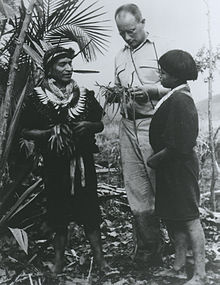Richard Evans Schultes | |
|---|---|
 In the Amazon, c. 1940 | |
| Born | January 12, 1915 Boston, Massachusetts, U.S. |
| Died | April 10, 2001 (aged 86) Boston, Massachusetts, U.S. |
| Alma mater | Harvard University |
| Known for | Native American uses of entheogenic, hallucinogenic plants; finding source of curare; campaigning for rainforest |
| Awards | · Gold Medal - Linnean Society of London · Gold Medal - World Wildlife Fund · The Cross of Boyaca |
| Scientific career | |
| Fields | Ethnobotany |
| Institutions | Harvard University |
| Doctoral advisor | Oakes Ames |
| Doctoral students | Michael J. Balick |
| Author abbrev. (botany) | R.E.Schult. |
Richard Evans Schultes (SHULL-tees;[1] January 12, 1915 – April 10, 2001) was an American biologist, considered to be the father of modern ethnobotany. He is known for his studies of the uses of plants by indigenous peoples, especially the indigenous peoples of the Americas. He worked on entheogenic or hallucinogenic plants, particularly in Mexico and the Amazon, involving lifelong collaborations with chemists. He had charismatic influence as an educator at Harvard University; several of his students and colleagues went on to write popular books and assume influential positions in museums, botanical gardens, and popular culture.
His book The Plants of the Gods: Their Sacred, Healing, and Hallucinogenic Powers (1979), co-authored with chemist Albert Hofmann, the discoverer of LSD, is considered his greatest popular work: it has never been out of print and was revised into an expanded second edition, based on a German translation by Christian Rätsch (1998), in 2001.[2]
- ^ Jonathan Kandell, Richard E. Schultes, 86, Dies; Trailblazing Authority on Hallucinogenic Plants, The New York Times, April 13, 2001, Accessed April 26, 2020.
- ^ Review of the expanded edition